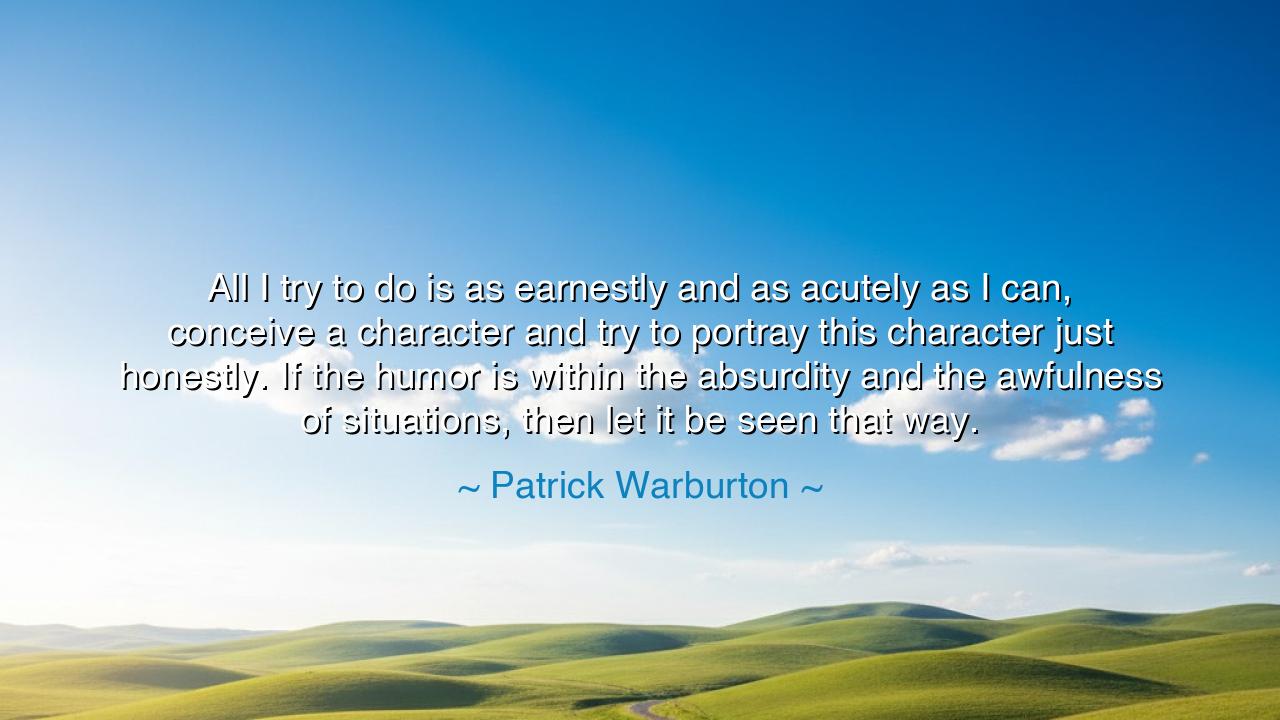
All I try to do is as earnestly and as acutely as I can, conceive
All I try to do is as earnestly and as acutely as I can, conceive a character and try to portray this character just honestly. If the humor is within the absurdity and the awfulness of situations, then let it be seen that way.






**Hear me now, O children of the future, for I speak of an art as old as the human spirit itself—**the art of acting. It is a craft that does not merely paint pictures of the world, but delves deep into the heart of human experience. Patrick Warburton, a master of this art, once said, "All I try to do is as earnestly and as acutely as I can, conceive a character and try to portray this character just honestly. If the humor is within the absurdity and the awfulness of situations, then let it be seen that way." These words, though simple, carry the weight of a profound truth about the nature of performance and the human condition itself.
In the world of acting, the task is not to create a performance that is crafted from exaggeration or deceit. No, the true actor must seek to understand the character—not just in the way they speak or move, but in their soul, in the very depths of their being. Warburton’s words speak to the importance of portraying a character with sincerity and honesty. To give life to a role is to look into the heart of the character and to understand their truths—no matter how complex, flawed, or imperfect they may be. In doing so, the actor opens a window through which the audience can peer into the very core of the human experience.
There is a wisdom here that echoes the words of Aristotle, who, in his teachings on tragedy and comedy, spoke of catharsis—the purging of emotion that comes through the witnessing of a story told with honesty and truth. Just as the great playwrights of old sought to mirror life in all its complexity, Warburton seeks to mirror the truth of his characters. Whether they face absurdity or awfulness, the actor’s role is not to obscure these elements, but to reveal them in their purest form. Through this, the audience may find not only humor, but understanding, and perhaps even healing.
Consider the ancient Greek theatre, where tragedy and comedy stood side by side. The actors of those times, such as Sophocles and Aristophanes, knew well that the greatest stories are those that reflect the full spectrum of human experience—joy and sorrow, absurdity and awfulness. In the face of the greatest suffering, there is often a form of humor, a strange release that allows the human spirit to survive even the most dire of circumstances. This is not the laughter of mockery, but the laughter that comes from an honest confrontation with life’s challenges.
In the modern world, we see this same wisdom reflected in the works of Patrick Warburton, who brings to life characters that are as real as the very people we encounter in our own lives. Take, for example, his portrayal of Puddy in Seinfeld—a character whose humor emerges not from overt jokes, but from his steadfast sincerity in the face of absurdity. There is a truth in his performance that transcends the script. His portrayal captures the essence of the human experience: that life, no matter how ridiculous or painful, is something we must confront with honesty and sometimes, humor.
The lesson that flows from Warburton’s words is simple but profound: to live and to create is to confront the absurdity and awfulness of life with honesty. This truth applies not only to the actor, but to us all. In our own lives, we are called not to hide from the difficulties we face, but to embrace them, to find the truth in the complexity of our own stories. And when we find humor in these challenges, let it be a genuine reflection of the world around us, not a mask to conceal what is uncomfortable.
As you walk through your days, remember the words of Patrick Warburton and the lessons they carry: truth, honesty, and the acceptance of life’s many contradictions. Whether you are creating or living, embrace the absurdity and awfulness with the same sincerity that Warburton brings to his characters. In doing so, you will find not only humor, but a deep understanding of the world and the strength to face whatever it may bring. And in that, you will become not just a performer, but a truth-teller—and that is the greatest art of all.






AAdministratorAdministrator
Welcome, honored guests. Please leave a comment, we will respond soon